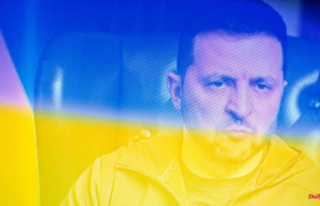The death of Pope Emeritus Benedict XVI. has also caused concern in Mecklenburg-Western Pomerania. The first pope from Germany in modern times was also controversial.
Schwerin/Rostock (dpa/mv) - The death of Pope Emeritus Benedict XVI. causes sadness among the Catholics in Mecklenburg-Western Pomerania. But personalities outside of this congregation also paid tribute to the theologian, who died on New Year's Eve at the age of 95. He was the first German pope after around 480 years when he was elected to succeed Pope John Paul II in 2005. Almost eight years later, in a spectacular move, he became the first pope to resign voluntarily in more than 700 years.
Archbishop Stefan Hesse of Hamburg praised Benedict as a formative teacher and theologian. "One thought of Pope Benedict has a special effect on me: Being a Christian is not a theory, not a construct of ideas, but first an encounter with a person, with Jesus Christ," said Hess. Christianity is passed on through attraction, not through teaching. "That gives our life a new horizon and thus its decisive direction."
The Catholics in the western part of Mecklenburg-Western Pomerania belong to the Archdiocese of Hamburg, those in the eastern part of the state to the Archdiocese of Berlin. The Berlin Archbishop Heiner Koch explained that Benedict had dedicated his life to the service of God and his church. "I admire the fact that he had the courage to resign from this office when he realized that he was no longer up to the demands," emphasized Koch.
However, he added: "His commitment to dealing with the scandal of sexual abuse in the Catholic Church as prefect of the Congregation for the Doctrine of the Faith and as Pope was obscured by irritating statements about his time as Archbishop of Munich-Freising. I very much regret that the theologian Joseph Ratzinger has fallen into disrepute among many."
During his pontificate, Benedict continued the conservative course of his predecessor. He resisted modernizing the church, which brought him a lot of criticism. His tenure was overshadowed by the abuse scandal that plunged the Catholic Church into a deep crisis. Benedict XVI died on Saturday morning at the Mater Ecclesiae Monastery in the Vatican, where he has lived since resigning.
The Prior of the Christian Ecumenical Community of Taizé, Brother Alois, was touched by Benedict's death. "We remain grateful to him and now entrust him to God's mercy. We are very touched that Pope Benedict is now entering the life of eternity and eternal life. And we are very grateful. There was a deep relationship between Taizé and him." , said Brother Alois on Saturday on the sidelines of the 45th European Taizé Youth Meeting with thousands of participants in Rostock.
He also recalled the Taizé youth meeting in Rome at the turn of the year 2012/2013, shortly before Benedict had announced his retirement from the Petrine ministry. At that time, 45,000 young people gathered for evening prayers on St. Peter's Square with the Pope, said the Taizé prior. The community in Taizé in eastern France was founded by the Swiss Roger Schutz during World War II. The future Pope Benedict and Brother Roger met during the Vatican Council (1962-1965). The founder of the order was stabbed to death in 2005 by a mentally ill woman.
The regional bishop of the Evangelical North Church, Kristina Kühnbaum-Schmidt, expressed her condolences to the Catholics in the North. "My thoughts are with everyone who is mourning the deceased Pope Emeritus Benedict XVI, especially with our Catholic brothers and sisters in the Archbishoprics of Hamburg and Berlin," said Kühnbaum-Schmidt in Schwerin.
The CDU parliamentary group leader in the Schwerin state parliament, Franz-Robert Liskow, emphasized: "The world is mourning the loss of one of the most important clergymen of our time, an outstanding thinker and great German." Benedict XVI have placed fundamental theological questions and questions of worldly existence at the center of his work. "Even if his work sometimes caused controversy, I appreciated that he successfully evaded the zeitgeist with his decidedly conservative orientation," emphasized Liskow. That takes courage and size.












